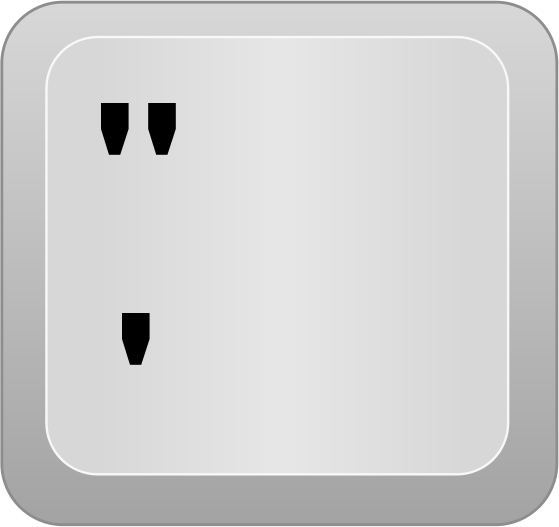- Advice
The red line: single or double quotes?
Dear Freelance Editor,

**Behold, my nemesis; the key above perturbs and confuses me. The familiar and comforting “, hanging over the completely mysterious ‘. **
When should I use single quotation marks? I work as a freelance blogger for a couple of clients, and I’m always unsure when to use ‘. It always looks like a mistake to me.
Should I use them occasionally? Never? How about now – sorry, excuse me: ‘how about now’?
Sincerely,
Don’t Quote Me, Bro
Dear Don’t Quote Me, Bro:
You have very strong feelings about your keyboard!
Single quotation mark rules are pretty easy to remember, if you’re writing material that’s dictated by United States standards (the Brits get more complicated; ignore them, unless you’re writing in the UK. Sorry, Yer Majesty!).
Here is when you should use single quotation marks:
When you are quoting people WITHIN another quote, or when you are citing titles (of books, movies, articles, etc.) within a quotation.
Let’s look at the examples, that’ll make things much clearer:
The girl said, “And she was all like, ‘I love your dress!’ and I was like, ‘Oh, this old thing? I only wear it to really boring parties,’ and she was like, ‘Oh em geeeeee, you are so funny.’”
Note that quotes WITHIN the quote are demarcated by single quotes. Another example:
Abraham Lincoln once told me, “Aristotle once said, ‘Don’t ever trust quotes from unverified sources.’”
Ahhh, so much clearer. Now let’s take a look at citing a title within a quotation:
“Then he said that his favorite book was ‘Atlas Shrugged’ – and just like that, the date was over.”
Run, girl. Run.
“He said his favorite movie was ‘The Princess Bride’ and I proposed to him on the spot.”
Well, that’s a pretty easy rule.
Yup.
So that’s it, then?
No – there are other situations in which one can use single quotation marks. The examples above are just the default.
Many of the other occasions in which one would use single quotation marks are limited to very specific circumstances. For instance, one might use single quotation marks to:
- denote a philosophical or theological term (“When we speak of the ‘soul’, we are speaking of an intangible self”)
- translate a word from another language, (“Merci means ‘thanks’ in French… I think”)
- quote someone in a newspaper headline (Prez tells Daily News, ‘Let’s Go Mets.’)
But that’s pretty insider-y stuff; for a complete rundown, look here. Odds are that if you’re in a field wherein you need to use single quotation marks in that fashion, you know it.
**But the Brits do single quotes and I love the Brits! **
Well, this is where it gets a little muddy. The Brits sometimes think of the single quote as a delightful style choice, and so do many Americans.
Single quotation marks can function to set apart words, to make the reader take special notice of a word or phrase. They can thus be helpful when HIGHLIGHTING a special term (good rundown of that here).
Let’s look at some examples.
- This so-called ‘music’ sounds like cats attacking fiddle players.
- The phrase ‘lol’ makes me want to gouge out my eardrums with a spoon.
- I know that Mom says that he’s a ‘catch' but when we met up for lunch, he looked like he had just finished washing the blood of his last victim out of his coat.
Now, any of these could also be distinguished by either double quotation marks OR italics – we’re just using single quotation marks to indicate to the reader that the word has a different ‘flavor’.
Again, it’s British-y! But it’s perfectly legitimate, as long as your client’s style manual doesn’t forbid it.
Just make sure that if you choose to use single quotation marks as indicators of emphasis, you use them consistently throughout your work. It’s flip-flopping that makes a Freelance Editor antsy.
Tip-top chip chap Cheerio, old pip.
This has been a message from a Freelance Editor.
Have a question for our resident Red Liner and occasional tea-sipper, Kate Hamill? Email her at khamill@freelancersunion.org, or leave it in the comments!
